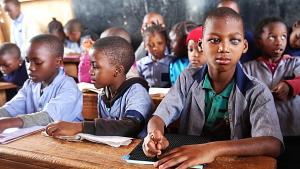
The grace we have been given is not to be used to ignore the consequences of whatever injustices we have committed but rather to help as change for the better. Not only are we called to act justly ourselves, we are called to promote justice in society, that is, social justice. We are not to neglect the common good. We are given grace not just for our own good, but for the good of everyone. Similarly, though we are shown mercy, we still will have to work out our salvation with fear and trembling, fixing and healing the damage which we have done (or as Jesus said, we will be expected to pay back the last penny of the debt we have incurred thanks to our actions; cf. Matt. 5:26). There is no way around it. We will have to face the consequences of our actions, especially if we do not repent and do what we can to heal the harm we have done to others:
Whatever your task, work heartily, as serving the Lord and not men, knowing that from the Lord you will receive the inheritance as your reward; you are serving the Lord Christ. For the wrongdoer will be paid back for the wrong he has done, and there is no partiality (Col. 3:23-25 RSV).
This is especially true in regards systematic structures of sin. When our actions either helped form or reinforce them, we must do what we can to deconstruct them and remove them. We cannot simply ignore the past, and the damage systematic structures of sin have caused. This is why racism will not be overcome if we ignore the structures which put it in place, for so long as they remain, they will influence society, harming many by the way it shapes the world we live in.
Racism promotes partiality. It promotes the idea that some people should be treated better than others for no reason other than the way they have been designated by race. Racism, moreover, fights any attempt to heal the harm it had caused for society. It suggests that such attempts themselves are racist, pretending it is partiality to try to help those who have been hurt by systematic structures of sin[1]
We must remember the past because our present is shaped by it. We must remember the racism of the past because it unjustly aided and promoted some people above others, but mostly because of how it hindered so many others. Even today, there are people who continue to receive unjust gains based upon the systematic structures which were put in place in the past. Expecting them to pay back those unjust gains is not discriminatory, but rather what is expected to be done by restorative justice. And, because many do not understand this, we must educate them, so that future generations will learn the lessons of the past and not make the same mistakes. We must not hide ourselves from the evils we have caused, personally or collectively; any attempt to evade our responsibility and the education needed to embrace that responsibility is itself just an attempt to justify and accept systematic structures of sin.[2]
Pope Benedict XVI saw the good which had been done to fight the scourge of racism, but he also saw the darkness which was looming ahead. He was worried that many would once again succumb to its evils. He saw the social and economic discrimination which remained. He said we must fight them in order to fix the system and eradicate the remaining evils of racism:
How important it is, especially in our time, that every Christian community increasingly deepens its awareness of this in order also to help civil society overcome every possible temptation to give into racism, intolerance and exclusion and to make decisions that respect the dignity of every human being! One of humanity’s great achievements is in fact its triumph over racism. However, unfortunately disturbing new forms of racism are being manifested in various Countries. They are often related to social and economic problems which can, however, never justify contempt and racial discrimination. Let us pray that respect for every person everywhere will increase, together with a responsible awareness that only in the reciprocal acceptance of one and all is it possible to build a world distinguished by authentic justice and true peace. [3]
St. John Paul II, likewise, saw the need to confront racism in and through education, to use education to safeguard the dignity of each and every human person:
To oppose racism we must practice the culture of reciprocal acceptance, recognizing in every man and woman a brother or sister with whom we walk in solidarity and peace. There is need for a vast work of education to the values that exalt the dignity of the human person and safeguard his fundamental rights. The Church intends to continue her efforts in this area, and asks all believers to make their own responsible contribution of conversion of heart, sensitization and formation.[4]
The official Catholic position can be said to be “woke.” The Catholic church promotes social justice. It tells us we must heal the damage caused by systematic structures of sin. It tells us we must replace the structures of sin with new, just structures, ones which includes teaching children about the evils of racism and how to make sure those evils do not return. That is, what is being promoted by education programs decried by many as “CRT” (which, technically, is not CRT), is exactly what Popes have said should be established. The history of racism should be studied, its causes and justifications examined and deconstructed, its harm demonstrated, and what is necessary to reverse it should be proclaimed. This is true, not only in the United States, with its history of abuse against African Americans, Asian Americans, Native Americans, and others, but it is also true in Europe, which is why Pope Francis spoke about this in relation to the Romani people:
Dear brothers and sisters, all too often you have been the object of prejudice and harsh judgements, discriminatory stereotypes, defamatory words and gestures. As a result, we are all poorer, poorer in humanity. Restoring dignity means passing from prejudice to dialogue, from introspection to integration. But how do we do this? Nikola and René, you have helped us in this regard: your love story was born here and it matured thanks to the closeness and encouragement you received. You felt empowered and you wanted a job; you felt loved and you grew in your desire to give something more to your children. [5]
Those who are unwilling to reach out with love to those who have been persecuted and abused, those who likewise are unwilling to help those who still suffer from the effects of historical racism policies, show they have yet to embrace the teaching of Christ. “ But he who hates his brother is in the darkness and walks in the darkness, and does not know where he is going, because the darkness has blinded his eyes” (1 Jn. 2:11 RSV).
Sadly, it seems we either have not learned the lesson we should have learned, or we have forgotten them. This can be seen in the way we continue to use and engage all kinds of stereotypes which dehumanize others. Such dehumanization gives justification for racist policies. Thit is why it is important to call them out, such as what we see happening with Black History Month in the United States. It should shame us all to see African Americans being engaged by stereotypes, such as seen in the kinds of school lunches given during this month:
Students at Nyack Middle School were served fried chicken, waffles and watermelon on 1 February.
The foods have been used as racist tropes against African Americans.
Officials from the school said its food supplier – Aramark – had changed the planned meal of cheesesteaks, broccoli and fruit.[6]
If this were a one-time incident, this could be seen as an accident, but actually this has happened before:
Aramark has been behind similar menus on past holidays commemorating Black people that sparked controversy at two universities going back more than a decade. In 2011, Aramark served chicken and waffles on Martin Luther King Day at the University of California, Irvine. [7]
While this might seem to be insignificant, by not dealing with the problem now, racism will be given the blind eye it needs to slowly sow its poisons into the minds of American children. It starts with minor slights, but, if those slights are not addressed as they emerge, they will grow in quantity and in quality, until at last, the full effects of the insidious poison is seen in the way racist ideologies uses those stereotypes to persecute and abuse those undermined by them. This is what we see happening thanks to the work of DeSantis and Sanders; their attempts to undermine the way children learn about racism is being used to elevate and promote ideologies coming from white supremacists, and if those ideologies are not stopped now, we will see more and more white supremacists not only in positions of power, but using such power to destroy the common good.
It is amazing and sad to see how much resistance there is to proper education. We see more and more people promoting the systemic structures of sin instead of systematic structures of justice. If, during Black History Month, we can see the push against social justice and its fight against racism being engaged by many American politicians, we should understand how bad the situation has come, for how can this happen unless we, as a people, have already allowed racists to come back in power?
[1] It is like some robber, having stolen money from someone in the past, says it is discrimination to expect him to return the money he had taken, saying that if he has to give up money, his victim should be made to give up money as well.
[2] Obviously, when studying the past, we need to be honest. We must recognize the good and the bad of what was done, not just the bad, and see how, even amongst those who have been unjustly brutalized and abused by the system, there were those who were also good and bad. We must not use the fact that there were those who did bad justify ignoring the systematic change which is necessary. Rather, this should show us how and why the system needs to be changed, for the system, more often than not, encouraged them to act as they did. That is, the more systematic structures of sin are in place, the more likely those who suffer from abuse will turn away from the good themselves, as they will learn the lesson of the system which promotes those who use and abuse others.
[3] Pope Benedict XVI, Angelus August 17, 2008. Vatican translation.
[4] Pope St. John Paul II, Angelus August 26, 2001. Vatican translation. ¶3.
[5] Pope Francis, “Meeting With The Roma Community” (9-14-2021). Vatican translation.
[6][6] Madeline Halpert, “US School Apologises For ‘Inexcusably Insensitive’ Black History Month Lunch” in BBC News (2-6-2023)
[7] Doha Madani, “School Food Vendor Apologizes — Again — For ‘Inexcusable’ Black History Month Menu” in NBC News (2-5-2023)
Stay in touch! Like A Little Bit of Nothing on Facebook.
If you liked what you read, please consider sharing it with your friends and family!
N.B.: While I read comments to moderate them, I rarely respond to them. If I don’t respond to your comment directly, don’t assume I am unthankful for it. I appreciate it. But I want readers to feel free to ask questions, and hopefully, dialogue with each other. I have shared what I wanted to say, though some responses will get a brief reply by me, or, if I find it interesting and something I can engage fully, as the foundation for another post. I have had many posts inspired or improved upon thanks to my readers.













